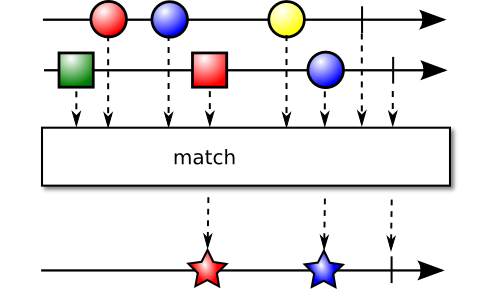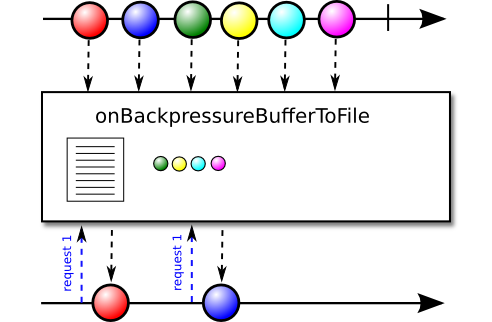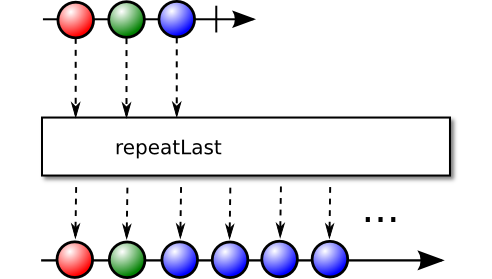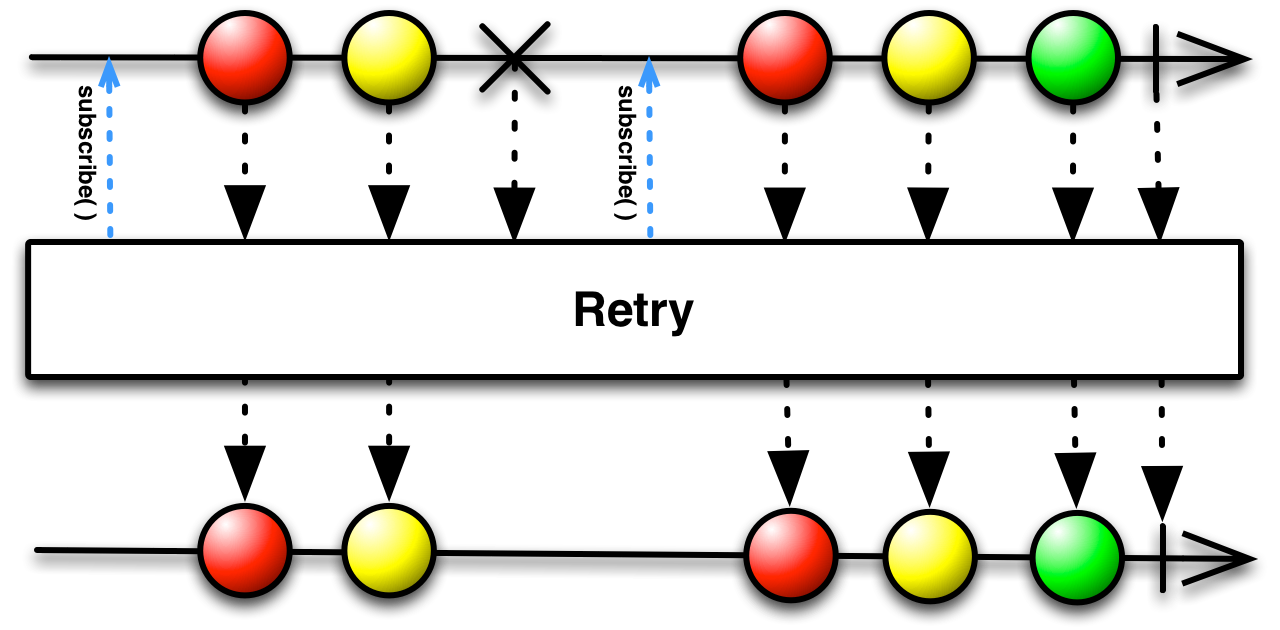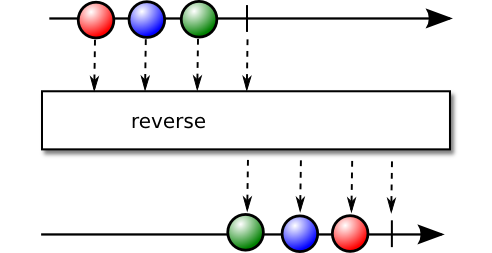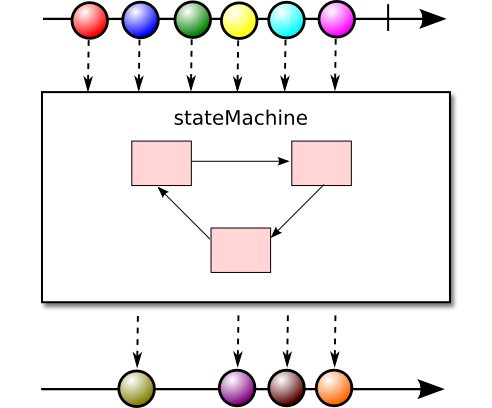Utilities for use with RxJava 2
Bit by bit, features from rxjava-extras will be migrated to use RxJava2 (and of course new features will be added here too).
Strings- create/manipulate streams ofString, conversions to and fromBytes- create/manipulate streams ofbyte[]StateMachine- a more expressive form ofscanthat can emit multiple events for each source eventonBackpressureBufferToFile- high throughput with memory-mapped filesFlowableTransformersObservableTransformers- tests pass on Linux, Windows 10, Solaris 10
- supports Java 1.6+
Status: released to Maven Central
Maven site reports are here including javadoc.
Add this to your pom.xml:
<dependency>
<groupId>com.github.davidmoten</groupId>
<artifactId>rxjava2-extras</artifactId>
<version>VERSION_HERE</version>
</dependency>Or add this to your build.gradle:
repositories {
mavenCentral()
}
dependencies {
compile 'com.github.davidmoten:rxjava-extras:VERSION_HERE'
}- Primary target type is
Flowable(the backpressure supporting stream) - Operators will be implemented initially without fusion support (later)
- Where applicable
Single,MaybeandCompletablewill be used - To cross types (say from
FlowabletoMaybe) it is necessary to usetorather thancompose - Transformers (for use with
composeandto) are clustered within the primary owning class rather than bunched together in theTransformersclass. For example,Strings.join:
//produces a stream of "ab"
Maybe<String> o = Flowable
.just("a","b")
.to(Strings.join()); concat, join
decode
from(Reader),from(InputStream),from(File), ..
fromClasspath(String, Charset), ..
split(String), split(Pattern)
splitSimple(String)
trim
strings
splitLinesSkipComments
collect
from(InputStream), from(File)
unzip(File), unzip(InputStream)
Builder for .retryWhen()
serverSocket(port)
repeat
mapLast
reverse
blockUntilWorkFinished
withThreadId
withThreadIdFromCallSite
doNothing
setToTrue
throwing
constant
addLongTo
addTo
assertBytesEquals
close
decrement
doNothing
increment
printStackTrace
println
set
setToTrue
constant
identity
throwing
throwing
alwaysFalse
alwaysTrue
Performs an action only if a stream completes without emitting an item.
flowable.compose(
FlowableTransformers.doOnEmpty(action));Finds out-of-order matches in two streams.
You can use FlowableTranformers.matchWith or Flowables.match:
Flowable<Integer> a = Flowable.just(1, 2, 4, 3);
Flowable<Integer> b = Flowable.just(1, 2, 3, 5, 6, 4);
Flowables.match(a, b,
x -> x, // key to match on for a
x -> x, // key to match on for b
(x, y) -> x // combiner
)
.forEach(System.out::println);gives
1
2
3
4
Don't rely on the output order!
Under the covers elements are requested from a and b in alternating batches of 128 by default. The batch size is configurable in another overload.
##onBackpressureBufferToFile With this operator you can offload a stream's emissions to disk to reduce memory pressure when you have a fast producer + slow consumer (or just to minimize memory usage).
If you have used the onBackpressureBuffer operator you'll know that when a stream is producing faster than the downstream operators can process (perhaps the producer cannot respond meaningfully to a slow down request from downstream) then onBackpressureBuffer buffers the items to an in-memory queue until they can be processed. Of course if memory is limited then some streams might eventually cause an OutOfMemoryError. One solution to this problem is to increase the effectively available memory for buffering by using disk instead (and small in-memory read/write buffers). That's why onBackpressureBufferToFile was created.
rxjava-extras uses standard file io to buffer serialized stream items. This operator can still be used with RxJava2 using the RxJava2Interop library.
rxjava2-extras uses fixed size memory-mapped files to perform the same operation but with much greater throughput.
Note that new files for a file buffered observable are created for each subscription and thoses files are in normal circumstances deleted on cancellation (triggered by onCompleted/onError termination or manual cancellation).
Here's an example:
// write the source strings to a
// disk-backed queue on the subscription
// thread and emit the items read from
// the queue on the io() scheduler.
Flowable<String> source =
Flowable
.just("a", "b", "c")
.compose(
FlowableTransformers
.onBackpressureBufferToFile()
.serializerUtf8())You can also use an Observable source (without converting to Flowable with toFlowable):
Observable<String> source =
Observable
.just("a", "b", "c")
.to(
ObservableTransformers
.onBackpressureBufferToFile()
.serializerUtf8())Note that to is used above to cross types (Observable to Flowable).
This example does the same as above but more concisely and uses standard java IO serialization (normally it will be more efficient to write your own DataSerializer):
Flowable<String> source =
Flowable
.just("a", "b", "c")
.compose(FlowableTransformers
.<String>onBackpressureBufferToFile());An example with a custom serializer:
// define how the items in the source stream would be serialized
DataSerializer<String> serializer = new DataSerializer<String>() {
@Override
public void serialize(String s, DataOutput out) throws IOException {
output.writeUTF(s);
}
@Override
public String deserialize(DataInput in) throws IOException {
return input.readUTF();
}
@Override
public int sizeHint() {
// exact size unknown
return 0;
}
};
Flowable
.just("a", "b", "c")
.compose(
FlowableTransformers
.onBackpressureBufferToFile()
.serializer(serializer));
...You can configure various options:
Flowable
.just("a", "b", "c")
.compose(
FlowableTransformers
.onBackpressureBufferToFile()
.scheduler(Schedulers.computation())
.fileFactory(fileFactory)
.pageSizeBytes(1024)
.serializer(serializer));
....fileFactory(Func0<File>) specifies the method used to create the temporary files used by the queue storage mechanism. The default is a factory that calls Files.createTempFile("bufferToFile", ".obj").
There are some inbuilt DataSerializer implementations:
DataSerializers.utf8()DataSerializers.string(Charset)DataSerializers.bytes()DataSerializers.javaIO()- uses standard java serialization (ObjectOutputStreamand such)
Using default java serialization you can buffer array lists of integers to a file like so:
Flowable.just(1, 2, 3, 4)
//accumulate into sublists of length 2
.buffer(2)
.compose(FlowableTransformers
.<List<Integer>>onBackpressureBufferToFile()
.serializerJavaIO())In the above example it's fortunate that .buffer emits ArrayList<Integer> instances which are serializable. To be strict you might want to .map the returned list to a data type you know is serializable:
Flowable.just(1, 2, 3, 4)
.buffer(2)
.map(list -> new ArrayList<Integer>(list))
.compose(
FlowableTransformers
.<List<Integer>>onBackpressureBufferToFile()
.serializerJavaIO())###Algorithm Usual queue drain practices are in place but the queue this time is based on memory-mapped file storage. The memory-mapped queue borrows tricks used by Aeron. In particular:
- every byte array message is preceded by a header comprised of
message length (int, 4 bytes) TODO
###Performance Throughput is increased dramatically by using memory-mapped files.
rxjava2-extras can push through 800MB/s using 1K messages compared to rxjava-extras 43MB/s (2011 i7-920 @2.67GHz). My 2016 2 core i5 HP Spectre laptop with SSD pushes through up to 1.5GB/s for 1K messages.
Smaller messages mean more contention but still on my laptop I am seeing 6 million 40B messages per second.
If a stream has elements and completes then the last element is repeated.
flowable.compose(
FlowableTransformers.repeatLast());A common use case for .retry() is some sequence of actions that are attempted and then after a delay a retry is attempted. RxJava does not provide
first class support for this use case but the building blocks are there with the .retryWhen() method. RetryWhen offers static methods that build a Function for use with Flowable.retryWhen().
flowable.retryWhen(
RetryWhen.delay(10, TimeUnit.SECONDS).build());flowable.retryWhen(
RetryWhen.delay(10, TimeUnit.SECONDS)
.maxRetries(10).build());//the length of waits determines number of retries
Flowable<Long> delays = Flowable.just(10L,20L,30L,30L,30L);
flowable.retryWhen(
RetryWhen.delays(delays, TimeUnit.SECONDS).build());flowable.retryWhen(
RetryWhen.retryWhenInstanceOf(IOException.class)
.build());Reverses the order of emissions of a stream. Does not emit till source completes.
flowable.compose(
FlowableTransformers.reverse());Custom operators are difficult things to get right in RxJava mainly because of the complexity of supporting backpressure efficiently. FlowableTransformers.stateMachine enables a custom operator implementation when:
- each source emission is mapped to 0 to many emissions (of a different type perhaps) to downstream but those emissions are calculated based on accumulated state
An example of such a transformation might be from a list of temperatures you only want to emit sequential values that are less than zero but are part of a sub-zero sequence at least 1 hour in duration. You could use toListWhile above (when migrated!) but Transformers.stateMachine offers the additional efficiency that it will immediately emit temperatures as soon as the duration criterion is met.
To implement this example, suppose the source is half-hourly temperature measurements:
static class State {
final List<Double> list;
final boolean reachedThreshold;
State(List<Double> list, boolean reachedThreshold) {
this.list = list;
this.reachedThreshold = reachedThreshold;
}
}
int MIN_SEQUENCE_LENGTH = 2;
FlowableTransformer<Double, Double> trans = FlowableTransformers
.stateMachine()
.initialStateFactory(() -> new State(new ArrayList<>(), false))
.<Double, Double> transition((state, t, subscriber) -> {
if (t < 0) {
if (state.reachedThreshold) {
if (subscriber.isUnsubscribed()) {
return null;
}
subscriber.onNext(t);
return state;
} else if (state.list.size() == MIN_SEQUENCE_LENGTH - 1) {
for (Double temperature : state.list) {
if (subscriber.isUnsubscribed()) {
return null;
}
subscriber.onNext(temperature);
}
return new State(null, true);
} else {
List<Double> list = new ArrayList<>(state.list);
list.add(t);
return new State(list, false);
}
} else {
return new State(new ArrayList<>(), false);
}
}).build();
Flowable
.just(10.4, 5.0, 2.0, -1.0, -2.0, -5.0, -1.0, 2.0, 5.0, 6.0)
.compose(trans)
.forEach(System.out::println);